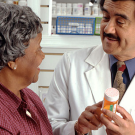At one of my former employers, we often debated the impact of statins on testosterone. After all, testosterone is derived from cholesterol, so if there's less cholesterol to go around, then testosterone levels may drop, too. Or at least that's what we theorized. On the other hand, lower levels of testosterone have been associated w/greater mortality while statin use has been shown to decrease mortality in the appropriate demographic. And so the debate went on . . .
Well, as I was doing my usual imitation of a blind squirrel searching for an acorn, I stumbled upon a meta-analysis published last month (really just over a week ago) in BMC Medicine in which the authors concluded that statin use does indeed lower testosterone levels! GASP! The horror! Does that mean we have to stop taking statins? Of course not!
First of all, while this was a meta-analysis of randomized controlled trials, the gold standard of research for demonstrating cause & effect, the authors were only able to locate 5 trials of 501 middle aged men w/high cholesterol randomized to various statins vs placebo. They also found another 6 trials of 368 young women w/polycystic ovarian syndrome which led to the same conclusion. But lest we throw the baby out with the bath water, let's note thatstatins lowered testosterone in men by 0.66nmol/L and 0.40nmol/L in women.
For those of us who didn't learn the metric system, that means thattestosterone dropped by a whopping 19ng/dL in men & 11.5ng/dL in women. When you consider that the reference range for Total Testosterone from Quest Diagnostics' liquid chromatography tandem mass spectrometry (LC/MS/MS) is 250-1100ng/dL for adult men, it's pretty apparent that statins don't really clinically impact testosterone level in men. On the other hand, there are studies afoot using statins to lower testosterone in women suffering from PCOS due to its more significant effect on a reference range of 2-45ng/dL.
Bottom line, if you're a guy and need to take a statin, take it and don't worry about it's statistically significant but clinically insignificant impact on your testosterone level. If you're female, then be more conscious of a statin's impact on your testosterone level. Whether it's a good thing (in case you have PCOS) or not is up to you. In the end, rather than rely on medications to lower your cholesterol and thus your heart disease risk, make healthy lifestyle changes. And meanwhile, make time to read the excellent accompanying editorial.
Alvin B. Lin, MD, FAAFP
Dr. Lin is an associate professor of family and community medicine at University of Nevada School of Medicine and an adjunct professor of family medicine and geriatrics at Touro University Nevada College of Medicine. He also serves as an advisory medical director for Infinity Hospice Care and as medical director of Lions HealthFirst Foundation. Dr. Lin maintains a small private practice in Las Vegas, NV. The posts represent the views of Dr. Lin, and in no way are to be construed as representative of the above listed organizations. Dr. Lin blogs about current medical literature and news at http://alvinblin.blogspot.com/.




